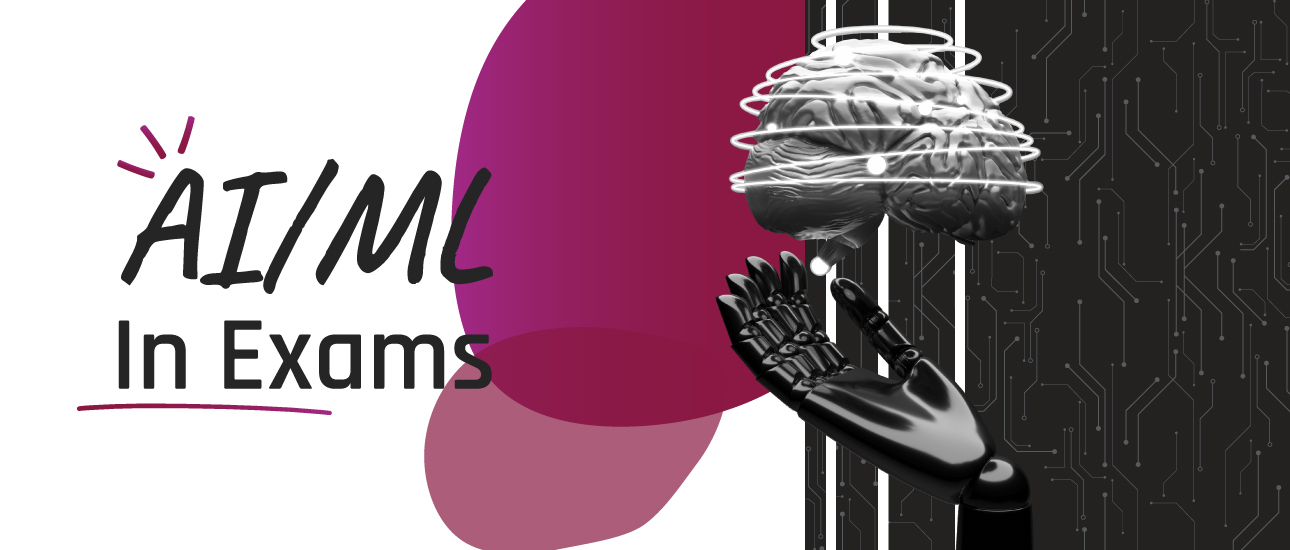LMExams

Artificial intelligence (AI) and machine learning (ML) are not just technology buzzwords. They have varied benefits and application in a variety of sectors like agriculture, finance, healthcare, and now in education too. AI can help teachers with mundane tasks like taking attendance, grading assignments, analyzing the performance of students and giving the teacher feedback about this. AI can also help transform the way exams are conducted and make them more secure and simpler to organize.
AI-based exams
AI-based exams (also known as AI-proctored tests) eliminate the need for onsite invigilators and can ensure a cheating-free environment. A proctor is a person who is certified to oversee the examination process. A remote proctor can oversee the exam from any location. Remote proctoring has made online exams very secure. When the exam begins, the audio and video feed of the student is sent to a proctor who will govern the exam. Voice and facial recognition technologies which are powered by AI can moderate exams without the need for human intervention.
Online marking and assessment
The onscreen marking system uses technology and has simplified the online marking process. All physical answer sheets are scanned and uploaded to the digital system and examiners can evaluate them from any location. Some online grading software can even read the handwriting of a student, understand it and grade it as well as a teacher does! Should the AI-powered tool make a mistake, the teachers can correct it and thanks to machine learning, the system will not make the same mistake again. These tools are 90% faster than humans and so exam results can be published immediately after an exam.
There are several advantages of using AI for grading answer sheets. One of them is improved efficiency and accuracy in grading exams. AI algorithms evaluate a large number of exam answers accurately and quickly, thereby reducing the time taken to grade exams. Another advantage is their objectivity and fairness in grading an answer sheet. They also reduce the possibility of a human error. AI is capable of detailed feedback on individual exam answers and provide detailed notes on the strengths and weaknesses of students, while also offering suggestions for improvement. This can help students understand their performance and improve their skills. Overall, there are several advantages of using AI in evaluating exam answers.
Minimize fraud and cheating
AI and ML are playing a huge role in enhancing the security in exams and reducing online cheating. AI and ML use facial and voice recognition technologies to do this. Individuals are authenticated using AI algorithms and ML based on their facial features. This way, the identity of the student can be confirmed before they begin an online exam. This prevents impersonation and other forms of cheating. Voice recognition systems authenticate individuals based on their voice. This can be used to monitor students for cheating and detect if a student is receiving assistance from anyone else or using unauthorized materials during an exam. Plagiarism detectors can help detect copying while webcams can monitor exam locations for any malpractices.
Summary
One of the benefits of using AI and ML technology in conducting exams is that they are high on security and weed out malpractices like cheating and impersonation. Conventional exams depend a lot on manual coordination and supervision. It is often a dreary and tedious process. Technology can be an alternative that not just saves time but is also hugely foolproof and efficient. AI and ML are here to stay in the space of exam administration. In the coming years, they will almost eliminate the need for human intervention in exams.
References
https://blog.mettl.com/ai-based-exams/
https://www.merittrac.com/blog/4-ways-ai-can-help-scale-exams-and-enhance-learning-outcomes